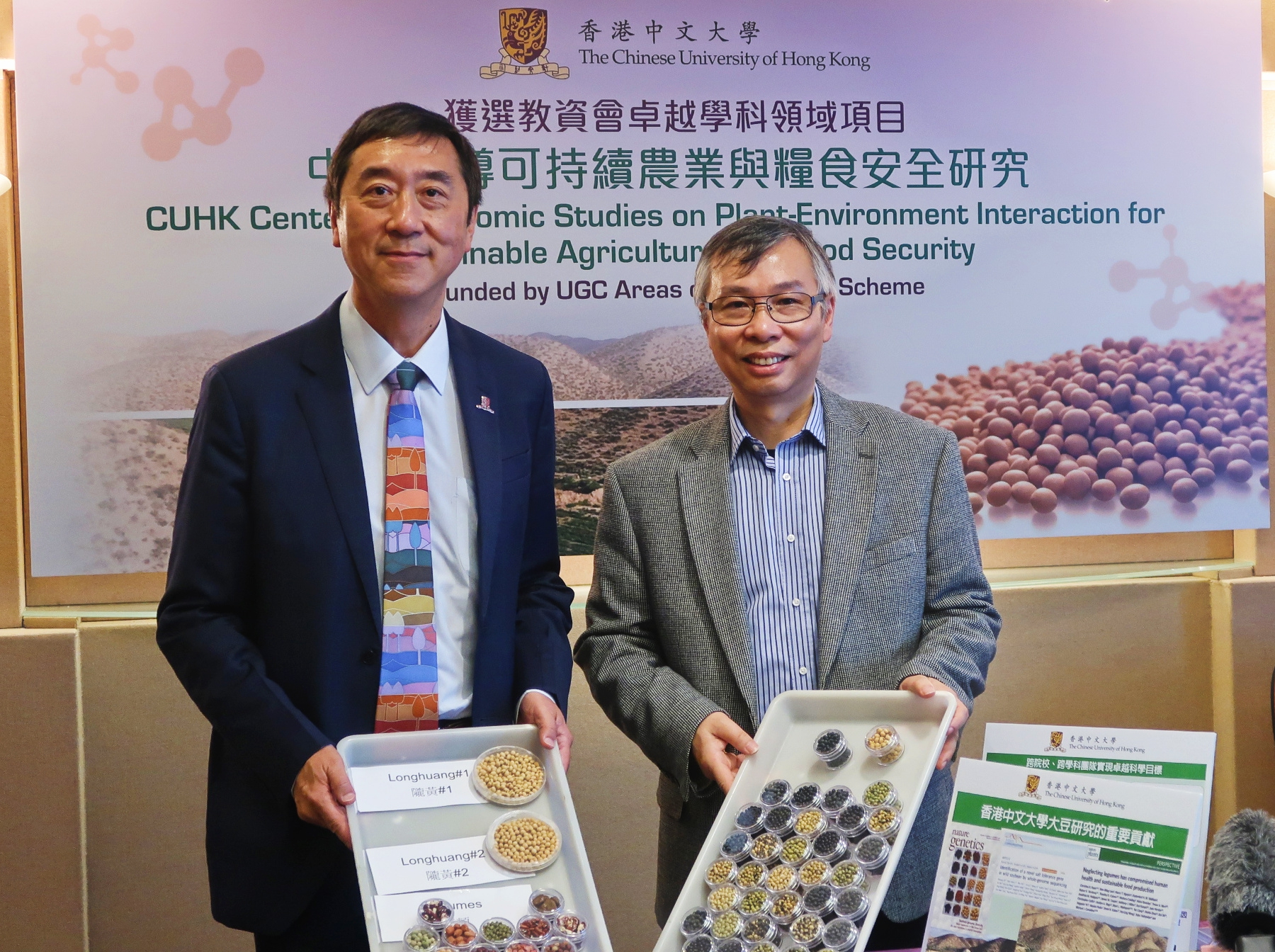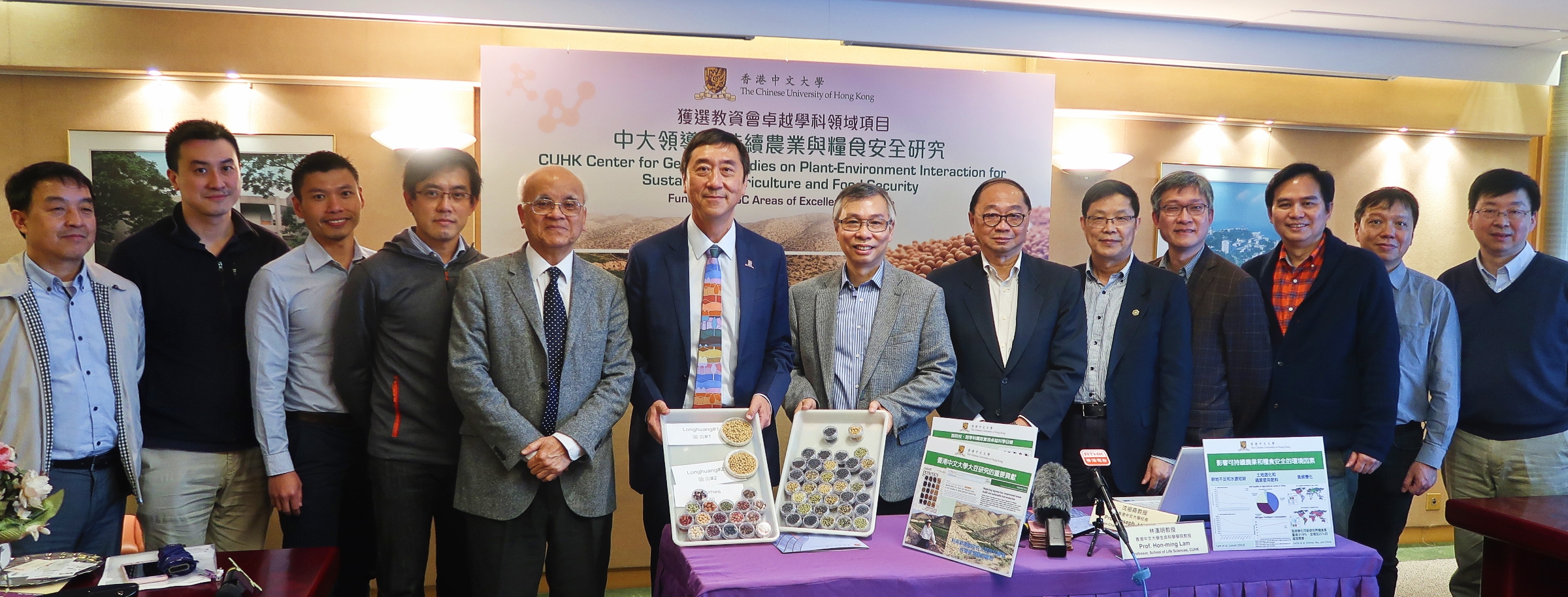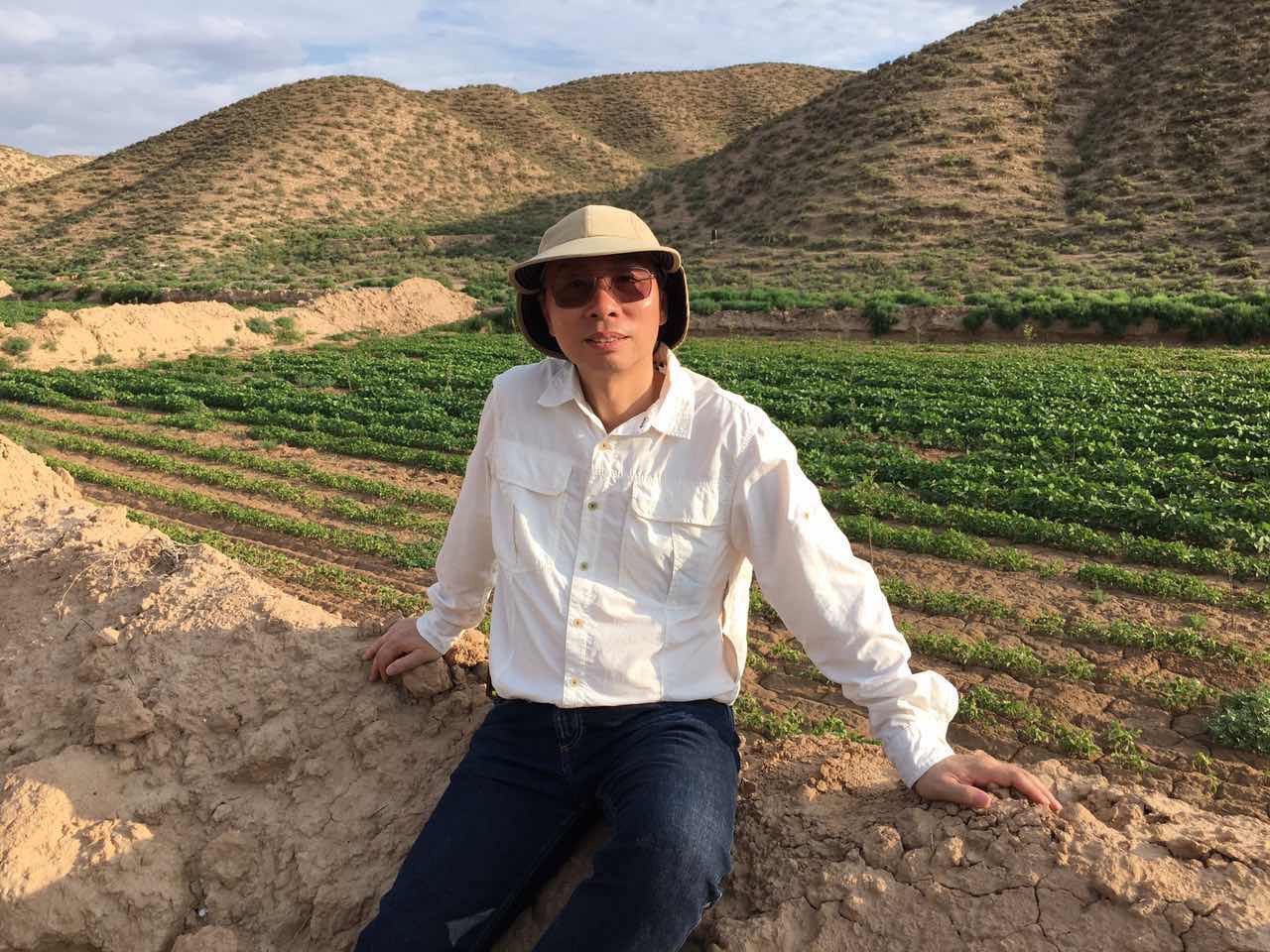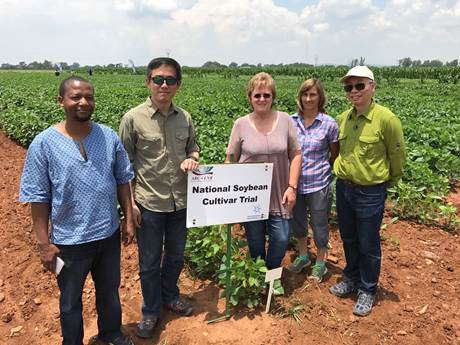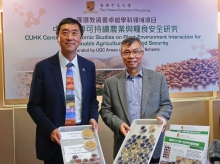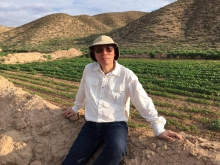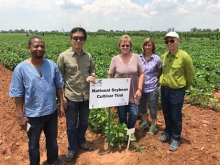CUHK
News Centre
CUHK-led Research Projects on Sustainable Agriculture and Food SecurityRecognized by UGC as Area of ExcellenceSuccession and Development of 20-year Legend of Research Excellence
Prof. Hon-Ming Lam of the School of Life Sciences, The Chinese University of Hong Kong (CUHK), leading a team of plant and agricultural researchers across nations and institutions, has been awarded funding in excess of HKD81 million over 8 years from the Areas of Excellence (AoE) Scheme under the University Grants Committee (UGC). The subsequent AoE Centre for Genomic Studies on Plant-Environment Interaction for Sustainable Agriculture and Food Security boasts a membership of 15 scientists from CUHK, The University of Hong Kong, Hong Kong Baptist University and Hong Kong University of Science and Technology, and from notable institutions in mainland China, US, UK and Argentina as well.
This research undertaking epitomizes the succession and development of plant and agricultural research in Hong Kong. Almost 20 years ago, Professor Lam played an indispensable role in the proposal, establishment and running of the AoE Centre on Plant and Agricultural Biotechnology (2000-2010), which subsequently led to the establishment of the Partner State Key Laboratory of Agrobiotechnology since 2008. With the foundation built, Professor Lam believes it’s time to take the research to a new level. By investigating plant-environment interaction, the new AoE Centre (2017-2025) is committed to developing new plant and agricultural technology with a view to strike a better balance between sustainable agriculture and food security. Soybean will be used as a model plant, and genomic study the primary tool.
Unleashing the Full Potential of Soybean in Recovering the Agroecological System and Attaining Agricultural Sustainability
Global agriculture has long been plagued by the lack of arable land, depletion of top soil and scarcity of water resources. In the 40 years between 1970 and 2010, the world’s per capita arable land was almost halved from 0.38 hectares to 0.20 hectares. It is expected to shrink further to 0.15 hectares by 2050. The situation in China is even more distressing. In the meantime, climate change poses further challenges to global food security. Studies have shown that in the worst case scenario, crop yield will decrease by 18% while the demand for water for irrigation will increase by 25%.
While crop yield is heavily constrained by the environment, planting of crops can in turn affect the soil ecosystem. The gene expression and gene function of the plant are known to regulate the plant-environment interaction. To conduct this line of scientific inquiry, soybean is an ideal model plant.
Nitrogen is the basic unit of living matters from DNA to proteins, and thereby all forms of plant and animal life. Land depleted of nitrogen will yield weak plants in low quantity. As a result, it has been a general agricultural practice to utilize nitrogen fertilizers to improve the yield. The world nitrogen fertilizer consumption has rocketed from 83 million tonnes in 2002 to 109 million tonnes in 2014, a whopping 26 million tonnes or 31% increase. Unfortunately, this yield improvement made possible by fertilizers is attained at the expense of the environment in the form of pollution and greenhouse gases emission.
In addition to being beneficial to human health, soybean can actually help recover the agroecosystem. It can fix nitrogen in the atmosphere and convert to its organic form on an average rate of 100kg per hectare per year. In other words, soybean cultivation can effectively lower the nitrogen fertilizer consumption, reducing the emission of pollutants and greenhouse gases. However, due to the public’s inadequate understanding of legume science, the full potential of soybean has yet to be unleashed. Being a pioneer in soybean genetics and genomic studies, Professor Lam will lead his team to unveil the underlying mechanisms of soybean’s interaction with the environment.
A New Direction of Agricultural Research Charted on the Basis of Past 20 Years of Research
In the last two decades, Professor Lam has forged long-term partnership with soybean breeders and researchers in China to develop stress tolerant soybeans and to reclaim abandoned land in the remote areas in China with soybeans. Professor Lam and his collaborators have screened and field tested quite a few soybean cultivars with salt and drought tolerant properties, two of which have already obtained approval from Gansu Province for actual farm cultivation.
Taking advantage of the recent scientific advancements, Professor Lam and his team propose to make use of the state-of-the-art technology in genomic study, molecular biology, biochemistry and cell biology to investigate the mechanisms of soybean-environment interaction. In addition to yield improvement both in quality and quantity, more attention will be placed on sustainable agriculture, with the ultimate goal to translate research knowledge into cutting-edge technology to make agriculture more environmentally friendly.
Professor Lam asserted, ‘The establishment of “The AoE Centre for Genomic Studies on Plant-Environment Interaction for Sustainable Agriculture and Food Security” has profound implications. It acknowledges Hong Kong’s persevering efforts over the past two decades and ensures that Hong Kong will continue to play a leading role in plant and agriculture research. The Centre consolidates local, mainland and international expertise to strive toward a shared collective goal – in search of a better balance between food security and agricultural sustainability. In the meantime, we hope to raise the public awareness of the multitude of benefits of legumes. Soybean has been chosen as the model plant. In the long run, our research experience with soybean will be extended to other crops.’
Prof. Joseph JY Sung, Vice-Chancellor of CUHK, expressed his excitement to the award under the AoE scheme, ‘CUHK has been leading the research on agricultural technology in Hong Kong for almost 20 years. Back in 2000, we won the first round bid for AoE status with a proposal to investigate plant and fungal biotechnology. Led by Prof. Samuel SM Sun and Prof. Hon-Ming Lam, that AoE Centre established CUHK’s flagship position, strengthened further by the inauguration of the Partner State Key Laboratory of Agrobiotechnology in 2008. Long term partnership on plant and agricultural research has since flourished between CUHK and many renowned research institutes in the Mainland. Last year, the soybean research led by Professor Lam was named a key research focus in the Worldwide Universities Network (WUN). This is a major international recognition, acknowledging Professor Lam’s excellent efforts and track records in soybean research. It also puts him in touch with many notable scientists working on the same area from all over the world. The institution of “The AoE Centre or Genomic Studies on Plant-Environment Interaction for Sustainable Agriculture and Food Security” will definitely further enhance the importance of Hong Kong’s plant and agricultural research of the global map.’
Online Platform to Strengthen the International Soybean Research Community
While past connections were mostly with prominent research institutes in China, the new AoE Centre will expand the collaborative network to include more international research units. Other than the experts from the US, UK and Argentina who were already recruited as members of the Centre, collaboration with South African researchers have been set in place. Networks have been developed with scientists in Australia, Japan, and S. Korea. To facilitate communication among international legume researchers and enable data and technology sharing, Professor Lam plans to put together an online community platform and database.
Biography of Prof. Hon-Ming Lam
Prof. Hon-Ming Lam, professor in the School of Life Sciences in CUHK, is the Director of the Centre for Soybean Research, and the Deputy Director of the Partner State Key Laboratory of Agrobiotechnology (SKL-CUHK). As a pioneer in soybean genomic and genetic research, he pledges to work toward alleviating the global shortage of food supply, thereby contributing to address the food security issues.
Professor Lam’s work at the SKL-CUHK includes decoding the genomes of 31 wild and cultivated soybeans (in collaboration with BGI-Shenzhen). He concluded that wild soybeans enjoy a much higher degree of genetic biodiversity. The publication in Nature Genetics in 2010 laid down the foundation for related research initiatives and projects, which have since been blooming in many areas of the world.
Over the decade, Professor Lam has been studying stress-tolerant genes in soybean with the use of state-of-the-art technology on genome sequencing and molecular biology. In 2014, he successfully identified and cloned a novel salt tolerance gene from wild soybeans which greatly enhanced the efficiency of breeding salt tolerant soybeans. The findings were published in Nature Communications in 2014. At the same time, Professor Lam lost no time in working with soybean breeders in China to develop stress tolerant soybeans. Experiments were carried out in semi-arid and arid regions in Northwest China with the aim to identify drought tolerant genes from soybean germplasms, and to eventually breed new drought tolerant soybean cultivars.
Professor Lam obtained his BSc and MPhil in Biology from CUHK. After receiving his PhD degree in Molecular Biology and Biochemistry from Northwestern University, he worked as a post-doctoral fellow at New York University before returning to his alma mater CUHK in 1997.
About the UGC Areas of Excellence Scheme
The Areas of Excellence (AoE) Scheme was launched by the University Grants Committee (UGC) in 1998. Up to 2016/2017, UGC has awarded 21 Areas of Excellence with exercise grants in support for their researches in seven rounds of the AoE scheme. Among the 21 research projects, 8 were led by the CUHK researchers. In the most recently announced 7th round of funding results, CUHK was involved in all 3 funded projects, while “The Center for Genomic Studies on Plant-Environment Interaction for Sustainable Agriculture and Food Security” is led by Prof. Hon-Ming Lam of CUHK.
Prof. Joseph J.Y. Sung (left), Vice-Chancellor of CUHK, congratulates Prof Hon-ming Lam on his achievement in agricultural research.
Prof. Joseph J.Y. Sung and Prof Hon-ming Lam with the research team of AoE Centre for Genomic Studies on Plant-Environment Interaction for Sustainable Agriculture and Food Security
Professor Hon-ming Lam successfully grew stress-tolerant soybeans in Gansu in 2016 to help improve or restore arable land.


